In America, all they have to fear is American politics itself
On Philadelphia’s historic Broad Street, in this summer of Trump and Clinton, Americans talk about hopes and fears
Bernie Sanders supporters gather at City Hall on the second day of the Democratic National Convention (DNC) on July 26, 2016 in Philadelphia, Pennsylvania. The convention is expected to attract thousands of protesters, members of the media and Democratic delegates to the City of Brotherly Love. (Jeff J Mitchell/Getty Images)
Share
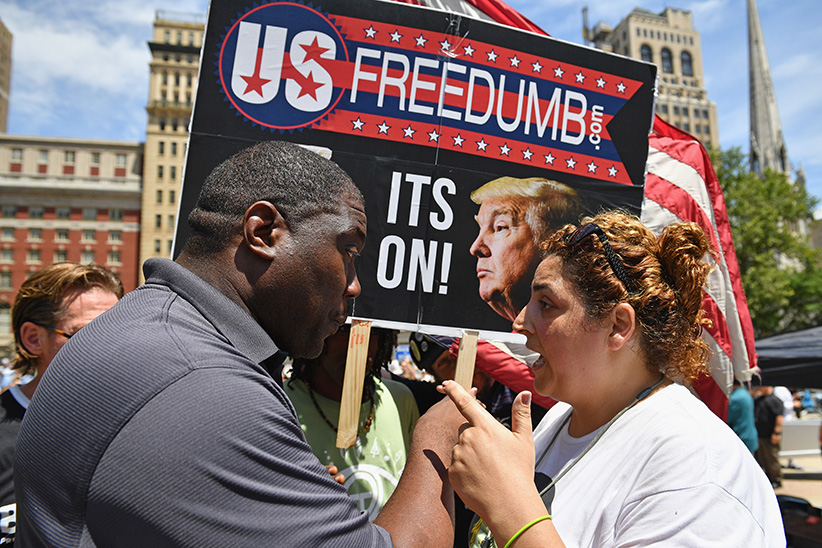
There was a time when the only thing anyone was afraid of on Broad Street in Philadelphia was the local hockey team. That was in the mid-1970s, when the quarrelsome Dave “the Hammer” Schultz, André “Moose” Dupont, Bob “the Hound” Kelly, Don “Big Bird” Saleski and the rest of the orange-and-white Flyers were winning two Stanley Cups with their fury, their finesse and their fists.
In 1974, 2½ million people hailed the Flyers’ championship parade along Broad Street—since 1681 the oldest, widest and longest urban boulevard in North America—a crowd that still is said to be the largest in Philadelphia’s four centuries of history, although Pope Francis might have come close to inspiring that number of communicants when he was here last September.
A generation later, another orange and white tough guy has been invoking fear across the American republic, even as the Democrats were assembling at the south end of Broad Street to anoint a woman for the Oval Office. That woman, Republican candidate Donald Trump snarled at his party’s convention in Cleveland last week, had bequeathed to a prostrate America a legacy of “death, destruction, terrorism and weakness.”
In Ohio, Trump promised to terminate—within hours of his inauguration—“the violence and oppression of a hateful foreign ideology . . . the gangs and the violence . . . the drugs pouring into our communities,” not to mention “the bad trade deals,” massive inner-city unemployment, rampaging political correctness, “the corporate spin, the carefully crafted lies, and the media myths.”
“I don’t understand people who trash-talk America,” countered Clinton, speaking in North Carolina on Monday en route to her own semi-unanimous acclamation. “I will not be the candidate of fear and smear.”
Watching the candidates, measuring their words, parsing their promises, were the towers and tenements of a great American city. Beneath them were the living witnesses to the elegance and destitution, wreckage and reconstruction, squalor and hope of the Cradle of Liberty. It was time to hear from them and measure their fears in the summer of Clinton and Trump. In 40° swelter, then, a long, long walk down Broad Street.
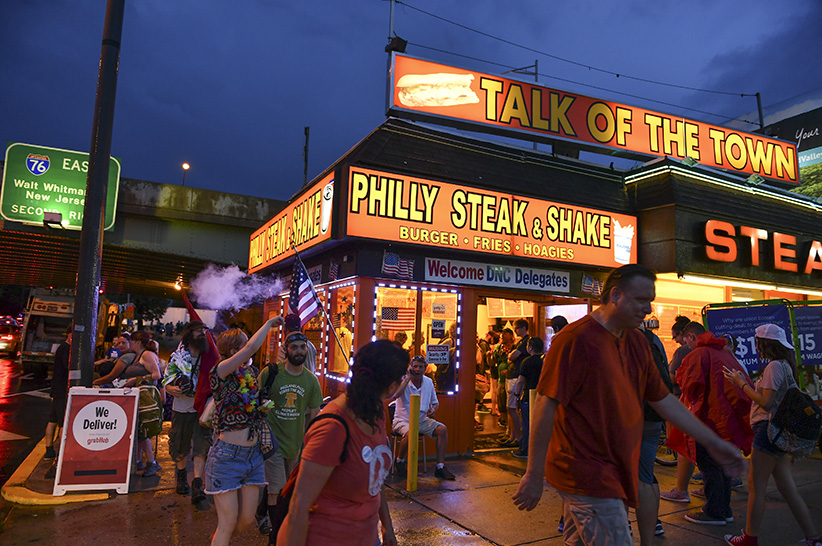
Charles Smith was sitting on the curb outside the armoured cashier’s cubicle at a Speedway gas station next to Home Gallery Furniture at 2917 North Broad. He was dressed in a white singlet and black training shorts that fashionably had been pulled down to display a swath of green plaid underpants. Smith was selling copies of his latest rap CD, entitled End Result?
On Smith’s right arm, extending from the elbow to the shoulder, there was a railroad of scar tissue. “I got shot,” Smith said. “I got shot in southwest Philly on Nov. 1, 2009, at close range with a sawed-off shotgun,” he elaborated. “I was homeless at the time. I was out there selling weed.”
“It’s no longer morals and Christian belief and faith,” he said. “It’s dollars and sense—if you’re not talking dollars, you’re not making sense.”
In a country where thousands of other young African-American men are murdered every year in acts of revenge—an appalling statistic that Trump was eager to cite in Cleveland—Smith said he harboured no urge to exterminate the man who nearly put him in his grave. “When my Mom went online and looked up the case, she saw that he’s got the same birthday as me. Isn’t that funny?
“My family might have some ill feelings because he almost murdered me, but I’d like to talk to this man and find out where his head is at. I was doing what I wasn’t supposed to be doing and God smacked me on my ass.”
Until a couple of weeks ago, Smith, who turns 30 this week, was washing dishes at a brew pub for $9.50 an hour, but then he got into an argument with the boss and was fired.
“What are your fears now?” the survivor was asked.
“I’m afraid I’m gonna get shot again, but I don’t let my fear become me,” he replied.
A few metres away, inscribed in the stone above the entrance to Home Gallery Furniture, three words still were visible: Joe Frazier’s gym. It was true—2917 North Broad Street used to be the training base of Smokin’ Joe, the heavyweight for whom the final bell tolled in 2011.
A few years before that, Smith had been selling his CDs at the Speedway when Joe Frazier got out of a limousine. “He called me ‘champ,’ and I’m just a regular guy!” the unemployed dishwasher remembered, still in awe. “He was the hero of this city and he was talking to me like I was his family. He was a hell of a man.”
Across the street from the Speedway, there used to be a mural depicting inspirational African-American figures, including another (formerly) beloved son of Philadelphia: Bill Cosby. “They took it down when the Pope was here so he wouldn’t see it,” Smith reported. Flanking the site were abandoned homes, low-end retailers, iron-gated liquor shops and a procession of derelict men. But through the summer haze the high glass towers of Center City shimmered like a mirage, five kilometres south.
“Who will fix this?” Smith was asked.
“Donald Trump is an asshole,” he answered. “Hillary Clinton is an asshole. Christ is on his way back. We’re in chaos and lots of people are oblivious. It used to be about love, compassion, making things right for the next generation. But walking through this city now, it’s so depressing. The empty schools, the money that’s not going to education.”
“Why do you stay in Philadelphia?”
“Because I want to believe that I’m gonna get to a position where I can initiate some kind of positive change.”
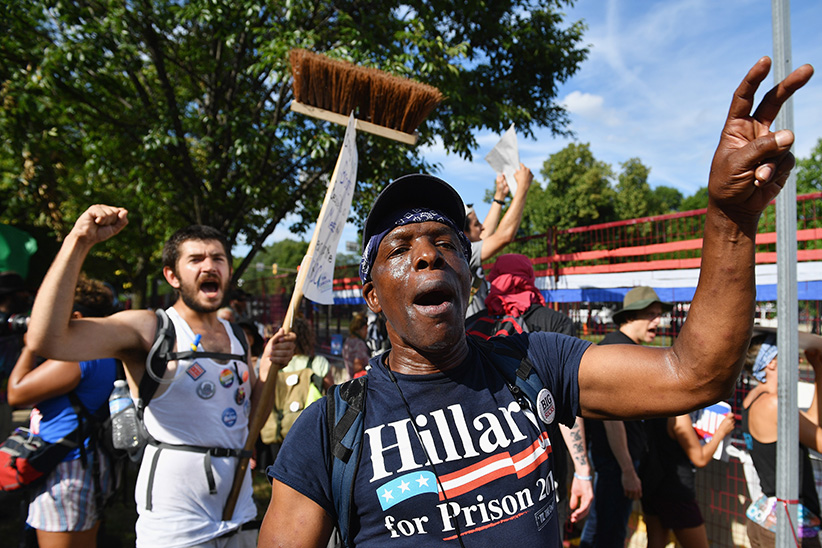
The 1100 block of North Broad is the nucleus of the campus of Temple University. There, a walker found Paola Jiménez and Kelle Durrua, two young Californians in town to be trained at Temple to serve a two-year stint in an inner-city school by an organization called Teach for America
“Donald Trump says we should all be afraid. What are you afraid of?” the student-teachers were asked.
“I’m afraid of the immigration laws,” answered Jiménez, who was born in Cuernavaca, Mexico. “I have a green card, but the rest of my family doesn’t.”
“What about radical Islamic terrorism?”
“I think it’s ridiculous how much Trump talked about how Democrats won’t say those words, as if just saying the words would make the problem disappear,” said Durrua, who is the granddaughter of a submarine commander and whose career goal is to be a trauma surgeon in the United States Navy. “Of course I’m afraid of terrorism, but that doesn’t mean to hate all Muslims. It’s easy to let fear overcome you.”
“Do you love America?” the girls were asked. A recent Gallup poll revealed that Millennials were less likely to express pride in their republic than any other generation ever sampled.
“I’d like to be able to love it,” Kelle said.
“Have you ever in your life chanted ‘U-S-A! U-S-A!?’”
“Only when we were in Ireland, watching sports on TV.”
“What about Trump himself?”
“He’s a complete and total hypocrite. Besides, the Republicans notoriously s–t on Teach for America.”
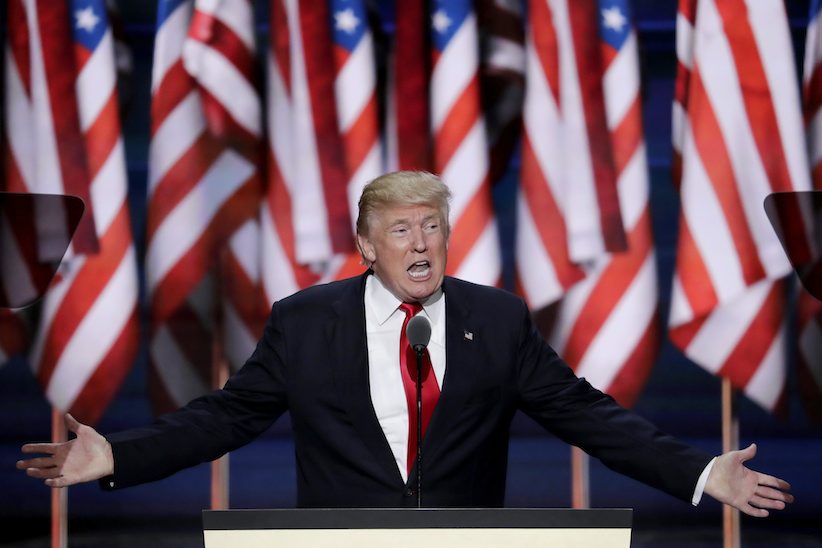
The entire facade of Benjamin Franklin High School at the corner of Broad and Spring Garden was covered with artwork that read:
WHEN I AM AT PEACE . . .
. . . My mind gets clear of the wrong things
. . . All is silently cherished
. . . I will finally be free of resentment
. . . I get engaged with my inner self
A couple of blocks east on Spring Garden was the house where Edgar Allan Poe wrote The Raven and tried to sell it for nine bucks. A couple of blocks down Broad was the Philadelphia Academy of the Fine Arts, the oldest art museum in this country. And past that, this day, were thousands of people chanting “No coal, no oil! Keep your carbon in the soil!”
One of them was another visiting Californian, Kyra Seymour, who was wearing a homemade credential that identified her as a “Bernie peacekeeper.” She was standing in front of the Arch Street United Methodist Church, a block north of Philadelphia’s 19th-century City Hall with its six-metre-thick masonry walls and its famous statue of William Penn, the city’s founder and the state’s eponym, at its pinnacle.
“What are you afraid of?” Seymour, an accountant-turned-landscaper (“I had to get outdoors”) was asked.
“I’m afraid of people in fear,” she said. “I believe that fear is normal, fear is natural; you can’t be brave without knowing fear. But I’m afraid of people letting fear control them. I live in a deep-red Republican county, up where California meets Oregon. Where I live, I see a lot of people who are afraid.”
Around her swirled a carnival of activists shouting anti-fracking, anti-petroleum, anti-capitalist, anti-palm oil, anti-Trans-Pacific Partnership and pro-Bernie Sanders anthems and anti-Hillary epithets and holding up red cardboards with hammers and sickles and the rather depressing proclamation that “America Was NEVER Great.”
“Bernie has endorsed Hillary,” Seymour was reminded. “Have you?”
“I have not endorsed Hillary, and I will not endorse Hillary,” she replied. “I have never had an enduring relationship with that woman.”
“Are you afraid that an Islamic State truck could plow into this crowd?” Indeed, trailers and lorries of all descriptions were rumbling unimpeded along the six lanes of Broad, laden with who-knows-what.
“I am not trying to put it out there that it might happen,” Seymour said. “That’s life. It’s like if we get a meteor strike, it’s out of your control. If it hits you, you’re down for the count or in a world of hurt.”
“Trump says there is a way to control it—keep all the Muslims out of the United States of America.”
“That’s bulls–t,” Seymour sniffed.
This, last week, was Barack Obama’s take on fear: “The one thing that I think is important to recognize is this idea that America is somehow on the verge of collapse, this vision of violence and chaos everywhere, doesn’t really jibe with the experience of most people. I hope people, the next morning, walked outside and birds were chirping and the sun was out and this afternoon, people will be, you know, watching their kids play on sports teams and go to the swimming pool and folks are going to work and getting ready for the weekend.”
It was true—even as the anti-almost-everything protesters marched eastward from Broad Street toward Independence Hall and the Liberty Bell, the fountains on the plaza on the west side of City Hall were turned on and children were splashing and romping, joyous through the spray.
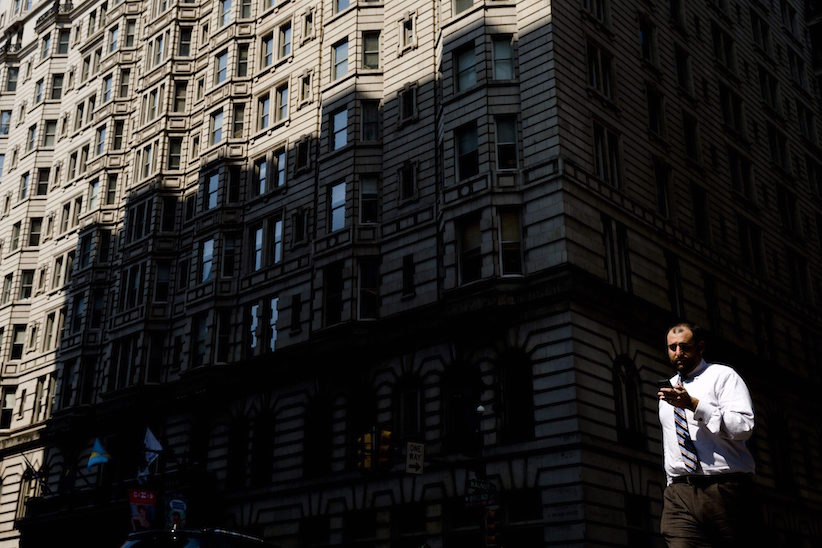
Southward, then, Broad Street resumed its stately course, past the Academy of Music, past trendy cafés and handsome brownstones and later, as the flamboyant core of the city petered out, devolving into car washes and bodegas and Chinese take-outs and free walk-in medical clinics for the indigent.
This was South Philly, where a certified public accountant named Said Amara sat behind his desk at 1626 South Broad. He was an immigrant out of Casablanca, Morocco, who had lived for more than a decade in Philadelphia.
“What are you afraid of?” he was asked.
“Personally,” Amara confessed, “the only thing I am afraid of is Trump himself. I’m Muslim, and the words he says are planting the seeds of violence against me. I think people are ignorant, and they will be motivated by his racist statements.
“Before Trump, I knew people are racist, but I thought, ‘If you don’t like me, that’s your problem.’ But now I am physically afraid for my wife and my daughters, because they wear the scarf. The other day, I picked up my nine-year-old at school and she said, ‘Daddy, if Donald Trump is president, will they send us away?’ ”
“I have to vote for Hillary now,” Amara said. “It’s not that I don’t like her, but I have wished for somebody better.”
Outside Amara’s accountancy office, and for several blocks along South Broad, the flags of every state and territory were mounted on each side of the boulevard to welcome Democratic conventioneers. Then, on Monday, about 50 Sanders supporters staged a sit-in at the Mississippi flagpole and demanded that the city fathers remove the detestable (to the protesters) banner, which preserves in one quadrant the Battle Flag of the Confederacy. Within hours, they did. “The Confederate flag raises strong feelings in our city and across the country,” a Philly official said.
The Goldstein brothers, Glenn and Scott, were in their off-price shmatte shop at Broad and Passyunk that was named, eloquently enough, 1421 Shoppe Inc. Not a single item in the store was manufactured in the U.S.A. (A typical label reads “Calvin Klein Made in Indonesia.”) This humiliation, of course, will change with Trump: “I am going to bring our jobs back to Ohio and America,” he vowed in Cleveland last week.
“What are you afraid of?” Maclean’s asked the brothers.
“Going to the bank and finding out that they don’t have any money,” joshed Scott.
“Disappointing my mother,” jibed Glenn.
The brethren turned serious.
“I’m afraid of someone blowing up New York again,” Scott said. “I’m scared somebody with a bomb will blow up the Lincoln Tunnel or something like that, not that I want to give them any ideas.”
“Do you mean you’re afraid of radical Islamic terrorism?”
“Of course. ISIS, or some wannabe ISIS.”
“Who can end this?”
“I’m going to say probably God.”
“Do you like the idea of having a businessman in the White House?”
“Of course, but not if the businessman is Donald Trump. Why not Warren Buffett? Nobody worthwhile ever runs for president.”
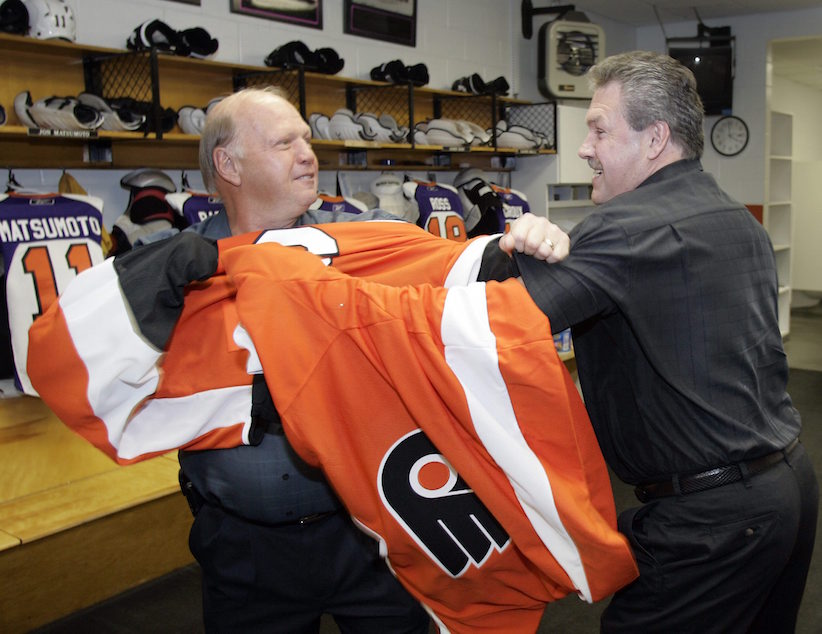
Back to the Broad Street Bullies. Bob “the Hound” Kelly of Oakville, Ont., scored the goal that won the Stanley Cup for the Flyers in 1975, but as a brawler, he was no Dave Schultz. He accumulated no more than 238 minutes in penalties in a single season, compared to the Hammer’s record of 472.
“People forget how much skill we had,” the Hound said now. “We had to kill off all of Dave’s penalties!”
“Did you sense that other teams were afraid of you?” he was asked.
“We did play with swagger, and there was a reputation that we had,” the Hound replied. “Every place we went, they would bring in some guy to get rough. The problem was, we had 20 guys.”
A quarter-century after he retired from the National Hockey League, Bob Kelly still goes to work on South Broad Street—not at the old Spectrum, which was demolished in 2011, but at the new coliseum where the Democrats have come to confess their dissension and grudgingly acclaim their candidate. He is a convener of the Flyers alumni association and an American citizen who—like 200 million of his countrymen—has a hell of a choice to make in 2016.
“I just wish there were two more candidates with a little more credibility,” he said, reprising the dilemma of a dubious and suspicious nation. “Trump talks tough, but he screwed so many people when he built those casinos in Atlantic City and people got paid off at pennies on the dollar.”
“As an American,” the old Bully was asked at the bottom end of Broad Street, “what do you fear?”
“I’m afraid we’ve become soft,” he answered. “We could be doing so many good things. We need to clean ourselves up before we commit money, people, effort and peoples’ lives to trying to fix everybody else’s problems overseas.”